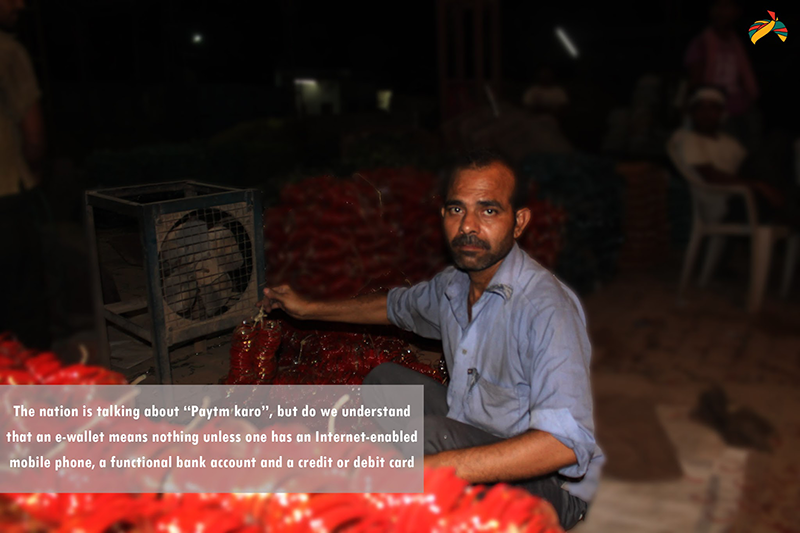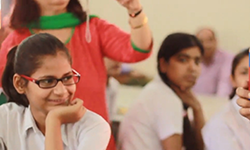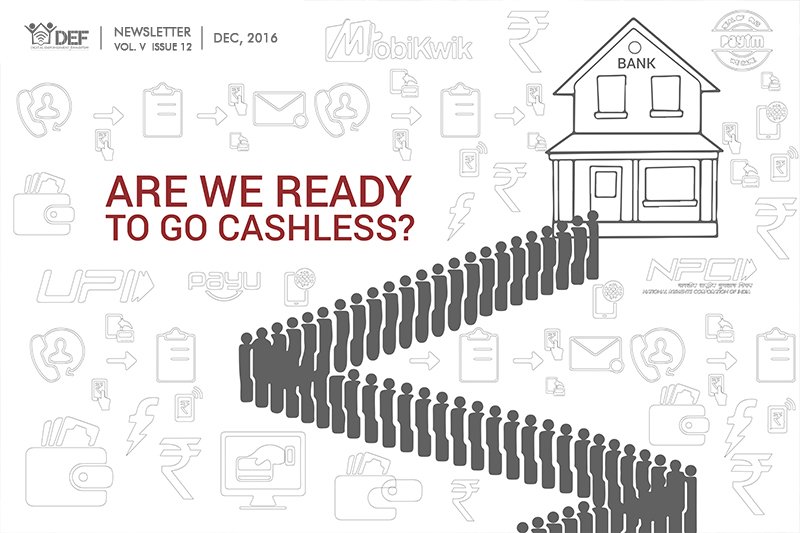
Dear Readers,
This year should be dedicated to the emergence of the Power of the Crowd. And Internet has effectively democratised the system for people to leverage their rights. Social media has become key to our lives for uncensored access to information and networking. Infact, it is the first point of contact with Internet for many in semi-urban and rural India where it has become synonymous with the Internet.
While social media platforms have democratised information dissemination, the concept of crowdsourcing is democratising access to resources. Crowdsourcing may be a new concept in India now, but it’s gaining momentum, slowly but steadily. And we received an overwhelming response when we hosted the Crowdsourcing Week Summit in Bangalore this year. It also gave us the courage to start a crowdfunding campaign for one of our projects too — to raise funds to complete the post-production of our documentary film ‘Ocean in a Drop’, directed by Australian film-maker Andrew Garton. Though we could not meet the target, we are sure we’ve come out stronger and learnt a lot.
However, power and responsibility are two sides of the same coin. Awareness of our rights and duties in the digital world becomes paramount so that they are not compromised in the name of national and online security.
And so we initiated the ‘Digital Citizen Summit’ this year, along with our partner Friedrich Naumann Foundation (FNF), to perpetuate discussions between relevant stakeholders to keep the government on its toes.
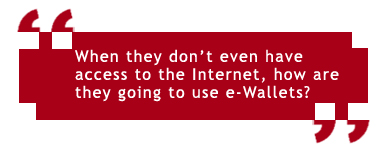
While we discuss “digital citizens”, we can’t ignore that almost 70 per cent of rural India is still not connected. For these changes to reach them is a far-fetched dream; and the slow pace of the National Optic Fibre Network has not helped. Further, instead of becoming wind beneath the wings of grassroots change-makers, the government this year clipped their wings by way of demonetsation. Rural economy has come to a standstill. When they don’t even have Internet connectivity, how are they going to use online payment tools and digital wallets? Consequently, whatever little growth we made through the year, it has come undone. Hence, I’m forced to end this editorial on a bleak note.
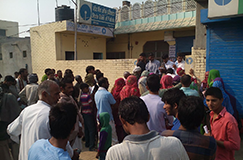
On November 8, 2016, a surprise address to the nation by the Prime Minister took India by storm. That night, Narendra Modi declared, through a televised and radio address, that at midnight all existing currency of 500 and 1000 will become invalid; and in the next few days the government will begin to replace the old currency with new 500 and 2000 rupee notes. The measure was justified by the government stating that it is necessary to stop counterfeiting of the current banknotes allegedly used for funding terrorism as well as it is meant to be a crackdown on black money in the country. The move was allegedly also aimed at reducing corruption, drug menace and smuggling.
Minutes after the announcement, people started queuing up outside ATMs. Unfortunately, a lot of ATMS only had 500 or 1000 rupee notes to dispense because the ATM machines had not been stocked with 100 rupee notes in preparation of this “sudden” announcement. The sudden move by the government came out as a surprise to most and many of them were caught off-guard, with either no cash or now invalid cash. And the banks and ATMs were closed for the next two days. Read more
Knowledge Hub & Network
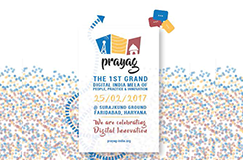
Internet is transforming our lives faster than we realise. However, almost 70 per cent of rural and semi-urban India is still far from being connected. The world has shifted to digital mediums for primary source of information but a large part of India is still living in information darkness. With this in mind, DEF in association with the Government of India’s Digital India programme is all set to explore the utility of digital platforms in highlighting traditional and diverse knowledge systems through Prayag. Read More
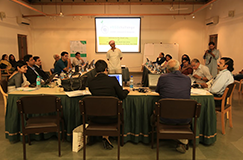
The eNGO Challenge Awards is aimed at identifying, recognising and felicitating organisations that have done exceptional work amid communities using various kinds of new age digital tools. On October 24, 2016, a day-long jury for eNGO Challenge Awards was held at Sanskriti Kala Kendra, New Delhi, to choose the best innovators among 62 finalists. This year, eNGO had received a total of 331 nominations across eight categories. Winners will be disclosed on February 25, 2017, at Surajkund Mela Ground, Faridabad. Read More
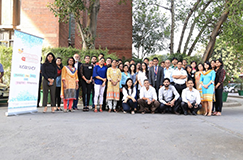
With the aim to orient stakeholders in the development sector to maximise the power of their social media presence, DEF in partnership with FNF organised a Social Media for Empowerment workshop at India Habitat Centre, New Delhi, on October 26, 2016. The workshop targeted civil society organisations, youth, academicians and entrepreneurs to understand more than just the basics of Facebook and Twitter for increased awareness, better outreach, wider networking, and global marketing. Forty-two people participated in the workshop. Read More
Access & Infrastructure
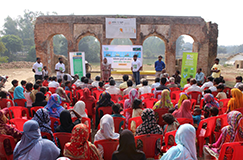
On November 18, 2016, Centre for Environment and Energy Development conducted a day-long workshop at the Baank-e-Loom centre in Saidanpur, Uttar Pradesh. The workshop was organised in an effort to raise awareness about the environment. The need to keep our environment clean to safeguard ourselves from various diseases such as malaria and dengue was also discussed. Towards the end, community members signed a petition, asking the state government to take necessary measures towards environmental preservation.
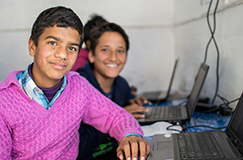
Recognising the efforts of DEF in providing digital access and connectivity in Rajasthan, besides digital literacy of course, the district administration of Alwar has decided to extend its support to it. CIRCs in the district now aim to reach out to 306 public schools and 72 private schools to digitally empower hundreds of students and open a window of opportunities for them. DEF operates its CIRCs in six villages of Alwar district — Mungaska, Chandauli, Roja Ka Bas, Malakhera, Bahadurpur, Vijay Mandir.
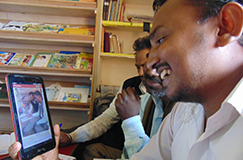
In a collaborative effort, Vodafone and DEF have launched RealPicture, an app created by Shared Reach Pvt Ltd, to increase efficiency in reporting at — to start with — 45 CIRCs of DEF. Project in-charges from DEF head office in New Delhi travelled to the identified CIRCs to train coordinators and trainers stationed on the ground. The purpose of the training was to acclimatise them with the app and enable their capacity building through a special session on operations & management. The app, meanwhile, is user-friendly and has simple, offline features too.
Education & Empowerment
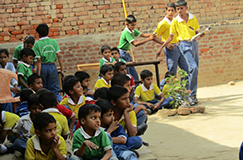
On November 14, CIRCs across the country celebrated Children's Day with great enthusiasm. Multiple activities, including art competitions, outdoor sports, indoor games and essay writing, were conducted at CIRCs. Other activities included a crafts competition at CIRC Jauhar Academy in Ranchi, Jharkhand; sports day celebrations at CIRC Bhairon Bhainin in Rohtak, Haryana; dumb-charades at CIRC Anjaiah Nagar, Andhra Pradesh; awareness camp on malnutrition at centres in Betul district, Madhya Pradesh.
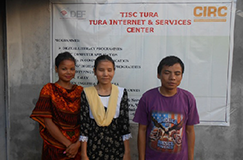
CIRC Tura in Meghalaya has been working tirelessly to help underprivileged students in the region avail quality education. This time, the centre staff helped several differently-abled and orphan students avail scholarships to make quality education more accessible for them. Besides this effort, the CIRC team also visited nearby schools and colleges to tell students about the various central and state government scholarships that are available for them. In many cases, the team even helped students fill the scholarship form.
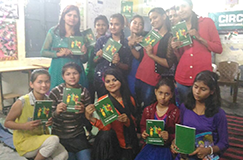
DEF, in collaboration with the British Council, has launched the English and Digital for Girl’s Education (EDGE) programme at CIRC Halduchaur in Uttarakhand. This course is designed on the concept of peer-to-peer-learning, making use of digital and non-digital tools; and gamification of teaching methods. The programme is now running at 21 centres of DEF in 12 states. Aimed at enrolling a total of 525 girls, it has successfully achieved 80 per cent of its target. Under EDGE, girls will go through systematic and comprehensive English learning training. Read More
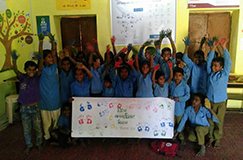
On December 10, 2016, CIRCs across the country celebrated Human Rights Day with great humility and sensitivity. A myriad of activities, including film screenings, poster-making competitions, team-building games and awareness camps on human rights were organised with the people of respective village communities. CIRC Saidanpur launched the EDGE programme and conducted a health camp on the occassion. Kooran centre in Rajasthan organised group discussions and poster-making activities. Many centres screened short films on Internet rights.
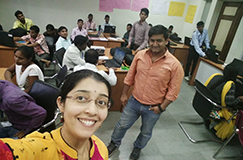
Bharat Rural Livelihoods Foundation (BRLF), an independent society established to upscale civil society action in partnership with the government, has initiated a programme to take students from nomadic tribes of central India on a unique study tour across 13 states of India. During this tour, the students will get a chance to visit multiple NGOs and experience India through their work. In this unique programme, DEF is responsible for conducting the Functional IT Skills Module at IIHMR University in Jaipur from November 19 to December 1, 2016. Read More
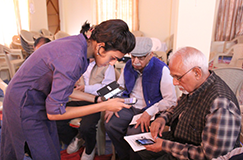
DEF and Help Age India have recently partnered to pilot ‘Digital Literacy for Senior Citizens’ in parts of India to digitally include senior citizens who often feel disconnected with the digital age. Despite access to digital infrastructure, there is often a fear of technology among the senior citizens that widens the gap between them and digital inclusion. Under this project, senior citizens will be trained and encouraged to use audio, visual or textual communication tools; make online transactions; and access entertainment or information on their smartphones.

Last month, a workshop for adolescent girls and women was held at the Baank-e-Loom centre in Saidanpur, Uttar Pradesh. Women from various backgrounds and age groups participated in the workshop that was led by a gynaecologist. It is said that five out of 10 women in rural India suffer from some kind of vaginal infection. Further, the discussion aimed at busting several taboos associated with menstruation. At the workshop, women were also trained in making their own reusable sanitary pads. Read More
Markets & Social Enterprises
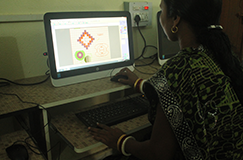
It’s been a very productive year for DigiKala, an initiative of DEF and Microsoft India under the Digital Cluster Development Programme, in Barpali and Nuapatna villages of Odisha. From digital literacy, community mobilisation and enabling access to government schemes to creating self-help groups and shifting traditional weavers to computer-aided design software, a lot has been put in to motion and achieved in this last one year. Each ofthe centres have reached their one-year target of training 500 students in digital literacy. Read More
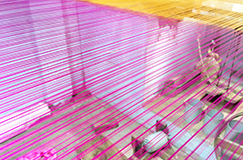
A little survey that we carried out in Tiruchirappalli district of Tamil Nadu tells us why it is extremely crucial to improve the livelihood of weaver communities to ensure that the handloom industry continues to exist and thrive. Natraj Nagar is home to 130 weaver families. However, only 30 of them still depend of weaving for livelihood. Similarly, in Manamedu, there are 1200 families but only 250 are involved in weaving. Most of those working in the sector are suffering from exploitation, low wages and inaccessibility to direct market. Read More
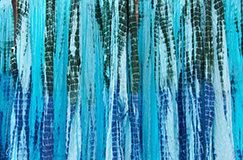
Project Chanderiyaan in Chanderi, Madhya Pradesh, is looking towards diversification of its products. The cluster that is known for making beautiful silk sarees is now expanding its horizon to include a range of products such as home furnishing, apparel, clutches and laptop sleeves to ensure optimum market reach. The cluster is also on the path of 100 per cent natural products as it will soon be selling naturally-dyed sarees, stoles and dupattas. In fact, 2017 will see weavers introduce a completely new range of designs for 'Chanderiyaan'. Read More
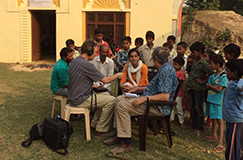
Celebrated journalist Sir William Mark Tully visited Baank-e-Loom in October 2016 to cover a special story titled ‘70 Years of Independent India’ for BBC World Radio. This segment of the show, which will be aired worldwide in February 2017, will present interviews with weavers and digital literacy students to understand the changes, if any, the industry has seen since India gained Independence in 1947. Baank-e-Loom is a DCDP project initiated by DEF in partnership with Ericsson to digitally empower the weaving cluster of Saidanpur, Uttar Pradesh. Read More
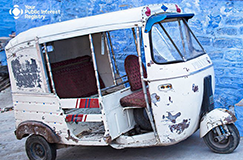
Recently, Public Interest Registry organised the #IndiaForGood contest for the best (attractive and informative) Indian profiles on OnGood.ngo. While the winner received Rs. 3,00,000 as cash prize, 50 runner-ups were awareded Rs. 15,000 each. Eight of them were from eNGO’s .ngo network — Manosri Tarun Bani Mandir, Supporting Association for Thematic and Holistic Initiative, Safe Hands Rehabilitation Society, Samajik Parivartan Sansthan, Concept Society, Avdhan Foundation, Babul Films Society and Sukalyan Welfare Society.
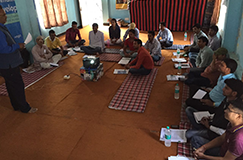
An ICT capacity building workshop for grassroots organisations was held in Uttarkashi, Uttarakhand, on October 10, 2016. Organised with the support of MADWS, the workshop saw participation of 25 organisations that learnt about ICT and digital tools, digital content creation and crowdfunding. The aim of the workshop was to make the participants aware of digital tools for greater visibility and promotion. A month later, ICANN and eNGO conducted a workshop for NGOs in Hyderabad to understand the ‘Role of Civil Society in Internet Governance’. Read More
Governance & Citizen Services

With support from Oracle, 10 CIRCs in six districts of five states have been performing outstandingly well in empowering underserved communities with access to last mile connectivity, digital literacy, citizen services, entitlements, livelihood opportunities and market linkages. Besides the physical centre, the team has been able to reach out to public institutions such as panchayat ghars, aanganwadis, public health centres and government schools, among others. The Oracle-supported project aims to make 5,000 citizens digitally literate across India.
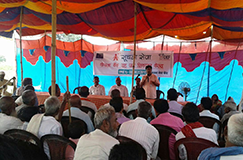
Information as a means is transforming India into a knowledge economy. However, there is still a large section of society which is living in information darkness. To digitally connect and empower such vulnerable communities with access to government schemes, DEF is running its Soochna Seva Kendra’s (SSK) in five different Indian states. Now, to escalate its inclusion efforts, DEF recently launched Yojana Bank in West Champaran, Bihar, that will run through SSK’s chain of network and volunteers on the ground. Read more
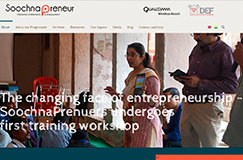
A Soochnapreneur training and capacity building workshop was organised from November 8 to 9, 2016, in Chanderi, Madhya Pradesh. The two-day capacity building programme was organised for 30 information entrepreneurs who were recently identified under the ‘SoochnaPreneur’ project of DEF-Qualcomm. The workshop aimed at building capacities of the first batch of ‘SoochnaPrenuers’ with the technical skills required to manage and disseminate information about various services, schemes, entitlements and digital services. Read more
Research & Advocacy
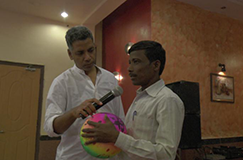
Last month, DEF conducted a one-day training workshop on ICT, social media and secure communications for grassroots human rights defenders (HRD). Organised in collaboration with Amnesty India in Chattisgarh, the workshop saw HRDs bring trained in tools and tactics to use traditional and digital media for activism. They were also provided hands-on training to protect themselves online. This training was attended by 40 HRDs, most of them adivasis fighting for coal miners, who had little knowledge of smartphones and social media. Read More
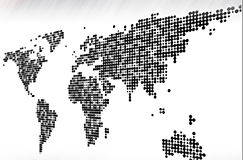
Community Connectivity: Building the Internet from Scratch is the latest annual report from the UN Internet Governance Forum (IGF) that reflects ideas that were discussed by its members in 2015-2016. One of the chapters, ‘A Network by the Community and for the Community', has been written by DEF team member Ritu Srivastava. Meanwhile, a research project by Noemie Battini of the London School of Economics explores the link between Internet connectivity and socio-economic development, with focus on India. This research mentions DEF and its work.

Four members of the DEF Research Team attended a capacity building workshop in Kuala Lumpur, Malaysia, from November 22-25, 2016. Organised by the Association for Progressive Communications, the workshop aimed at refining strategic thinking around alliance and movement building towards organisational or project objectives. Other participating organisations were EMPOWER from Malaysia and Bytes for All from Pakistan. The workshop also aimed at understanding the UN system and the multiple potential entry points for advocacy. Read More
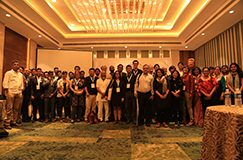
With the intention of providing a South Asian platform for dialogue on human rights online, DEF in association with FNF had organised the Digital Citizen Summit on November 11, 2016, at Hotel Royal Orchid in Bangalore. Organised at a time where the narrative surrounding online rights is rising, the summit focused on access, privacy, violence against women and communication blackouts, among others, with the objective to facilitate the exchange of information and ideas, and create a blueprint for future understanding of individual digital rights. Read More
ePostcard from Vimages
e-NGO of the month
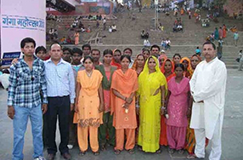
Located in Rajasthan, Health & Social Development Research Centre (HSDRC) carries out direct interventions in Jaipur district but caters to all of Rajasthan as a resource agency for networking with other non-government organisations by undertaking consultancies and organising training programmes. HSDRC works in the areas of health, women empowerment, livelihood and learning for development; and is an active advocacy organisation. It also empowers women weavers and block printing professionals.
Cyber Champ of the Month

The demonetisation-enabled cash crunch in India has hit people hard. And no matter how much you try to rely on plastic money and e-wallets, the Indian economy is largely cash dependent. And so, 48 hours after demonitisation was announced, Amit Bhor, Co-founder of Walnut — a personal finance tracking app — and his team rolled out a new feature on the app that allows users to know which ATMs near you have cash in them. It takes help of crowdsourcing to provide more information such as denomination of notes and the length of queue.
Data & Analysis

About Us
House No. 44, 3rd Floor Kalu Sarai, (Near IIT Flyover),
New Delhi – 110016
Subscribe to our mailing list
Email : def@defindia.net | URL : www.defindia.org
Tel: +91-11-26532786 | Fax: +91-11-26532787
